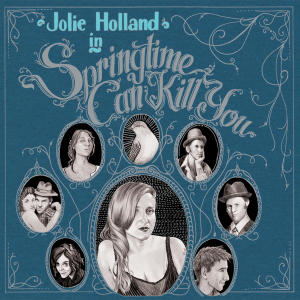 Two of the most stunningly original female singer-songwriters in today’s field of American music are both recording for Los Angeles’ independent label Anti-: Neko Case and Jolie Holland. And both redheads have new albums out in 2006, which makes it already a great year by my reckoning, and it’s only May. But where Case is known for her powerful pipes and harmony-drenched country-rock performances, Holland’s joys are quieter and more subtle. Her music is as unclassifiable as if it were some new species from outer space.
Two of the most stunningly original female singer-songwriters in today’s field of American music are both recording for Los Angeles’ independent label Anti-: Neko Case and Jolie Holland. And both redheads have new albums out in 2006, which makes it already a great year by my reckoning, and it’s only May. But where Case is known for her powerful pipes and harmony-drenched country-rock performances, Holland’s joys are quieter and more subtle. Her music is as unclassifiable as if it were some new species from outer space.
At the risk of echoing any number of other reviewers, Holland owned me from the first time I heard her sing “The Littlest Birds” on her home-recorded first release, 2003’s Catalpa. Through 2004’s Escondida to this new release, Springtime Can Kill You, Holland’s music follows a true trajectory of her own design. Or perhaps it’s not designed, it’s just what happens when a musician follows her muse where it takes her with little regard for popular trends. Why else would someone so idiosyncratically combine elements of folk, jazz, rock, country and pop balladry, played on an odd assortment of mostly acoustic instruments by her own band of friends, travelling musicians all, and sung in her unmistakeable airy drawl?
Holland is a writer’s musician; one gets the feeling that the words come first, and the tunes come along of their own accord to fit the sound, meter and needs of the lyrics. She confesses in interviews that she’s been writing songs since she was 6 years old, and it shows. Many of her songs have the feel of a child’s wide-eyed observation of whatever is before her: the sounds of a mockingbird in the tree, weeds growing around a bus stop, a new friend riding by on her bicycle with her dog running alongside.
Springtime is a 12-song cycle about love, its joys and disappointments. It opens with “Crush in the Ghetto,” a lovely and lilting love song with the sighing refrain of “look what you’ve done to me.” Lightly plucked electric guitar and lightly brushed drums accompany her singing, grounded by a low, thrumming bass and the distant soughing of horns and organ. She describes in a stream of consciousness everything she sees as she waits for a bus: “The weeds grow high, the birds flicker by / children are walking to school…”
Every song, if you listen attentively, is rich with such detail. “If you don’t go get what you need / something’s going to break on the inside,” she observes in the title track, a jazzy atmospheric number that is made more perfect, as are all these numbers, by the always-appropriate choices made by drummer David Mihaly and guitarist Brian Miller.
I found a couple of high points on this CD. One is the last song of what would be the first side of a vinyl album, “Stubborn Beast,” in which the protagonist confesses that she needs love but may try to fight it: “Like a stubborn beast when the barn is on fire / I might resist you when you try to save my life,” and repeats the second part of that couplet for emphasis. It’s emphasized by Keith Cary’s keening lap steel and — one first for this album — harmony vocals from Kate Klaire. The second standout moment is on “Nothing to Do but Dream,” a murder ballad with a casual nod to Robert Frost, hidden inside a stoner song, again with vocal assist from Klaire. It starts off languid and lazy, with what seems to be a slacker’s complaints: “The sun’s too bright / and the mountains are too far / and there’s nowhere in town / I can get to in my broken car.” But the music continues to rise in intensity as the protagonist remembers, against her will, what she has done: “I took my sister to the river and I came back alone …”
It’s not all so intense. On “Please Don’t,” Holland takes a common theme, one previously covered by Lucinda Williams in “Metal Firecracker,” pleading with a former lover to be discreet. I just love the way this one starts, though, with bitterly ironic humor: “The twelfth day of never came faster than ever / for the likes of you and I…” Not too many singers can get away with Donny Osmond references. And the very next song is a playfully woozy ode to a “Moonshiner,” in which she begs him to come back — but is it for his love or his liquor? “Moonshiner, moonshiner, why don’t you come back home? / Now I got to drink this storebought stuff / and go to bed all alone.”
In addition to having backup singers for the first time, Holland records three cover songs, including a delightful rendition of a Riley Puckett song she renders as “You’re Not Satisfied” with David Dondero on vocal harmonies and a twisted version of a New Orleans second line made up of a tuba, mellophone and euphonium. Crazy, man! That euphonium (or baritone horn) also shows up on several other songs, including the title track in a little duet with Holland’s spot-on whistling. She also sings and plays her wonderfully raspy box fiddle on the old parlor ballad “Adieu False Heart.”
The joys of Springtime Can Kill You are more subtle but also more intense than anything on Holland’s previous records. This is a recording that generously rewards repeated listens.
(Anti-, 2006)
